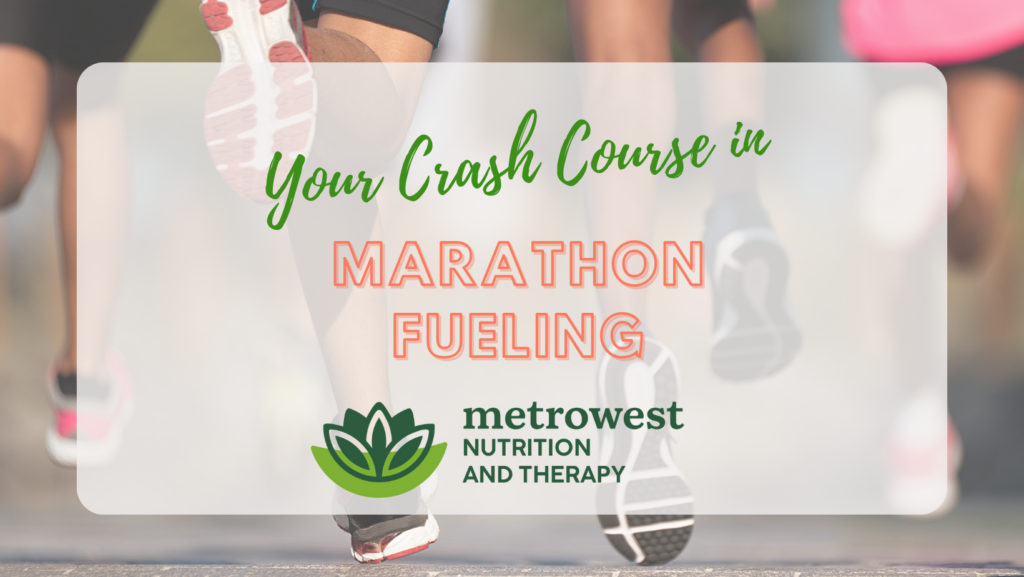
Your Crash Course in Marathon Fueling
How to eat, fuel, and hydrate for running 26.2 miles
Congratulations! You’re running a marathon. You’ve been training for months, and I’m willing to bet that you shed some blood, sweat, and tears in the process. You’ve gone through a few pairs of sneakers and have your outfit picked out for race day. But… do you have a marathon fueling plan?
First, an obligatory word of caution: Please don’t try anything new on marathon day or in the last few days leading up to your event. The stakes are too high for you to sideline yourself in the porta potty! But in the spirit of the Boston Marathon next week, I want to share a few tried-and-true recommendations for all things energy during your 26.2.
Make carbohydrates your friend
Your muscles, your blood cells, and your brain all use carbohydrates for energy. If your body were a car, carbs would be the gas, and it’s important to put gas in the tank at meals before and after you run. Why? Because carbs will be stored as glycogen in your muscles – enough to provide about an hour of energy.
At meals, I recommend using the high intensity “Performance Plate” on the Fuel & Hydration Guide as a guide to prioritizing carbohydrates, especially in the 2-3 days leading up to your event. This means filling at least half of your plate with carbohydrate-rich foods and shifting to smaller portions of protein, fats, and high-fiber foods (like vegetables). This will be helpful for your energy and for avoiding digestive issues during the marathon.
Some recommendations for easily digestible carbohydrates are:
- Potatoes
- Bread and bagels
- Cereal and oatmeal
- Bananas
- Graham crackers
- Pretzels
- Fig bars
Tip: Don’t let perfection be the enemy of good. If you’re struggling to eat a higher volume of carbohydrates, try working in an extra snack or sipping on juice instead of water.
Fuel during your run
In addition to prioritizing carbs at meals, I want to help you stay ahead of “bonking” or “hitting the wall” – aka having an energy crash and running on E. Since your glycogen stores won’t last forever, it’s important to continue fueling your body with carbohydrates while running. I recommend consuming 30-60 grams of carbohydrates per hour (and up to 90 grams per hour if your stomach is used to it).
The key here is to use very easily digestible carbohydrates that won’t upset your stomach. Most energy products (like gels, waffles, and electrolyte mixes) have about 20 grams of carbs per serving. To reach the goal of 30-60 grams of carbs per hour and maintain a steady flow of energy, I typically recommend fueling every 30-45 minutes.
Here are some common fueling products – by no means an exhaustive list!:
- Honey Stinger Waffle = 19 grams
- Honey Stinger Energy Chews = 39 grams for 1 full pack
- Gels (E.g. Gu, UCAN, Maurten, SIS, UnTapped): 19-25 grams
- Graham crackers: 36 grams for 3 sheets
- Applesauce pouch: 16 grams
- Fig bar: 25 grams
- Banana: 28 grams
Tip: It’s important to go into a race knowing what works for you. Buy a few products to see what taste, texture, and method of fueling you like. My clients typically spend weeks trialing and settling on their preferred combination! We aren’t talking about hydration here, but many electrolyte mixes contain carbohydrates, too; a combination fuel and hydration strategy can be very effective.
Reach out for personalized support
Whether you’re a new runner, an experienced marathoner, or someone who’s exploring their relationship with exercise, there is no bad time to start working with me – a HAES-aligned sports dietitian who will help you challenge diet culture, heal disordered eating patterns, and learn how to nourish and fuel your body.
If this resonates, I’d love to help. Marathon-friendly meals and personalized fueling strategies are just two of many things I can help with in 1:1 nutrition counseling or in group sessions with teams and group organizations. I also accept insurance! Reach out to set up a consult here.
Learn more about Heather Lavery, sports dietitian here.



